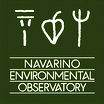Information for the media
NEO in a glance
The Navarino Environmental Observatory (NEO), located in Messinia, Greece, is a pioneering example of international partnership between the academic community and the private sector in the fields of climate change and environmental sciences in the Mediterranean region. NEO started its full operation in 2010 as a collaboration between Stockholm University, the Biomedical Research Foundation of the Academy of Athens (BRFAA) and TEMES S.A. and has already become an international hub for frontline research and education, where scientists from all over the world meet to exchange knowledge and ideas. So far, more than 50 peer-reviewed articles related to NEO have been published.
Research at NEO addresses several of the sustainable development goals of the United Nations Agenda as well as of the Paris Agreement. An atmospheric monitoring station operates at NEO (Methoni, SW Messinia, Greece), since 2011, to track climate change signals and air pollution. It is an important part of a European Network and fills the gap of missing data from this part of Europe. Physical, optical and chemical properties of aerosols and local-to-regional scale pollution and atmospheric composition are monitored and analysed in relation to observations on a wider scale of the Mediterranean region. Regarding water resources, NEO researchers have studied natural and human-driven changes in water availability and quality, and developed methods and tools for quantification and support of sustainable water resource management. Of special interest for the Mediterranean region, they have, e.g., investigated and identified: i) tipping points for seawater intrusion into coastal groundwater under rising sea level and other hydro-climatic changes; ii) cost-efficient management of coastal aquifers via recharge with treated wastewater and desalination of brackish groundwater; and iii) water resource impacts of Mediterranean tourism, agricultural irrigation, and other land- and water-use developments in a changing climate. Monitoring and analyses of socio-ecological parameters in the nearby coastal lagoon (Gialova lagoon) and adjacent streams, rivers and cultivated land, aiming to provide viable alternatives for long-term sustainable tourism and agriculture were initiated in 2016. The process takes into account resilience to future climate changes and minimization of the impact of tourism and agriculture on the Natura 2000 sites, exploiting the expertise and experience of local stakeholders. Finally, NEO scientists have produced lake sediment-, tree-ring- and speleothem-based climate time series for Greece, covering the last 10000 years. The climate time series provide information on natural climate variability that will improve our understanding of both natural and human-made processes governing our climate.
In addition to the research taking place at NEO, emphasis is given to the education and training of students and young researchers. Five PhD and 12 MSx theses have already been completed, while more are in progress. Workshops and events, such as cafe-NEO (scientific cafe), are organised to promote research and to bring together academics, corporates and policy-makers to discuss importan environmental issues of local, regional and global interest.
NEO leaflets
NEO leaflet in English (click to download the pdf)
NEO leaflet in Greek (click to download the pdf)



